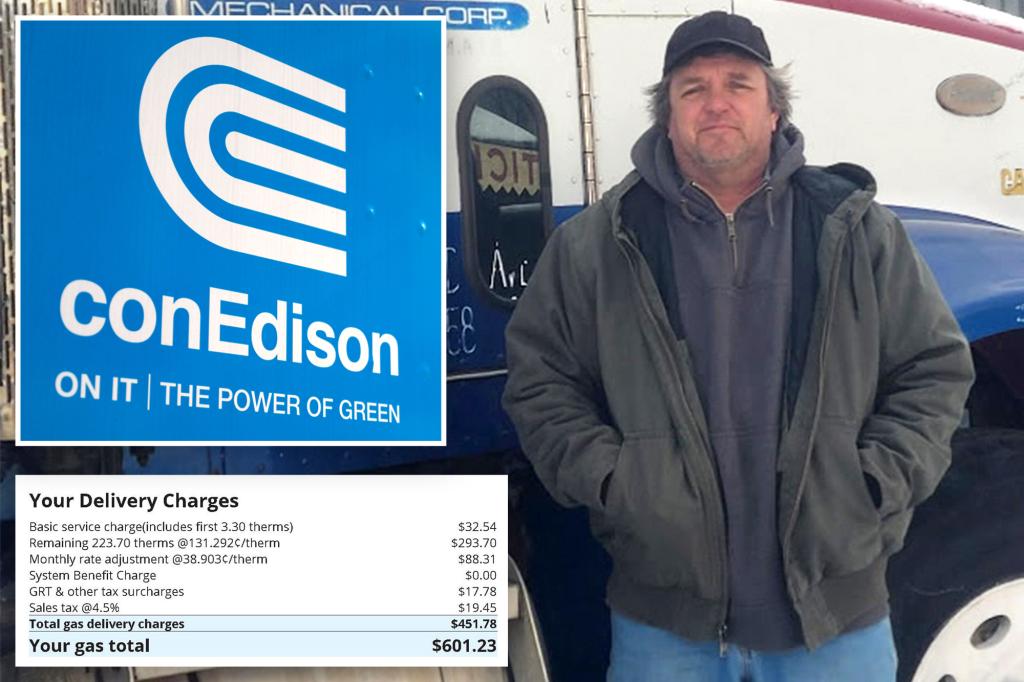A landlord in Queens is so fed up with his sky-high gas heating bills from Con Ed that he’s switching to dirtier home heating oil to warm one of his buildings.
Residential-building owner John Norton blamed New York’s “green” mandates, which he said are forcing customers such as himself to abandon natural gas by making it more expensive.
“I can’t afford the gas bills anymore — I’m tapped out,” Norton said, acknowledging he is already struggling to pay what he owes — as the utility revealed it only hopes to squeeze more out of consumers with new whopping rate hikes unveiled last week.
Norton, also a licensed plumber, provided The Post with a copy of a recent Con Ed bill that revealed the cost to deliver gas to one of his three six-family residential buildings was a staggering three times more than the price of the gas supply itself.
His total gas bill for the building from Oct. 23 to Nov. 25 was $601.23.
The bill broke down to $451.78 for gas delivery and $149.45 for the gas supply.
He also got zapped with a $200 late fee — bringing his grand total to $801.23.
“That’s ridiculous,” said Norton, who contacted The Post after seeing that ConEd is proposing to shock customers with double-digit increases next year.
The utility giant wants New York’s utilities regulator, the Public Service Commission, to allow it to jack up average electric bills by 11.4% and send gas bills soaring 13.3%. — a move that could mean a wallet-busting $1,848 more per year than some customers paid in 2020.
Norton said he is buying a new $7,000 high-efficiency oil-hot-water boiler for at least one of his buildings to replace Con Ed-supplied gas.
He said the move will save him hundreds of dollars a month by getting the oil delivered directly to his house.
Norton already has an oil delivery supplier lined up.
He said his bill could drop to $120 a month by paying $3 a gallon for home heating oil to fill his 40 gallon boiler.
“Now I get rid of the gas delivery charge. What choice do I have?” Norton said.
“How can anyone keep up with that heating bill?”
Bronx Congressman Ritchie Torres ripped Con Edison’s delivery charges — approved by state state regulators at the Public Service Commision appointed by Gov. Kathy Hochul — as way out of line.
“Con Ed has been systematically overcharging working-class and middle-class New Yorkers. The customers of Con Ed pay as much as 200% more in gas delivery charges than the customers of National Grid,” Torres said Sunday, referring to another gas utility in the city.
“Instead of protecting the people of New York from price-gouging, Governor Kathy Hochul and the Public Service Commission have enabled ConEd to prey upon the working class and middle class in an age of inflation.”
Con Edison, in a statement on Sunday, defended the delivery charges that were approved by Albany regulators.
“The delivery charge, set by the New York State Public Service Commission, covers the costs of running one of the nation’s most expansive and complex energy systems safely and reliably,” the utility giant said.
“This includes the work of our highly trained planners, operators, and crews, as well as safety projects like leak detection and main replacement, our first-in-the-nation gas detectors in homes, and various other technologies to ensure our customers have safe energy when you need it.
“The delivery charge also includes taxes and fees imposed by state and local governments, such as property taxes. These taxes and fees typically make up 25 to 30% of a gas heating customer’s bill, and about 35% of the delivery charge.
“Con Edison is dedicated to keeping costs affordable while maintaining our top-notch safety standards, which are crucial in our uniquely dense service area.”
Taxes and fees accounted for about $158 of Norton’s total $601.23 tab, a source said.
A PSC spokesman said any customer who believes he’s been overcharged or wronged can file a complaint with the agency at https://dps.ny.gov/file-complaint
In its filing for a rate increase, Con Ed said mandates are forcing it to upgrade the electrical grid to comply with a green agenda under the state’s Climate Leadership and Community Protection Act.
The aggressive plan under the law requires New York to slash greenhouse gas emissions by 40% by 2030 and achieve 100% zero-carbon-emission electricity by 2040.
State law requires all new buildings under seven stories to be fully electric by 2026, with larger structures following three years in 2029.
In New York City, Local Law 97 — the Climate Mobilization Emissions Law of 2019 — sets limits on the greenhouse gas emissions of buildings to help New York City reach the goal of a 40% reduction by the year 2030 and 80% reduction in citywide emissions by calendar year 2050.
In another respect, Norton is going in the direction of the green movement.
He is building a new home along the Rockaway Peninsula that will be solar-powered with its own battery storage system to store the electricity.
The Queens resident and businessman said he is so upset with utility bills that he’d like to go completely “off the grid.
“I’ll be so green out that you’ll regret it,” he said.
Read the full article here

